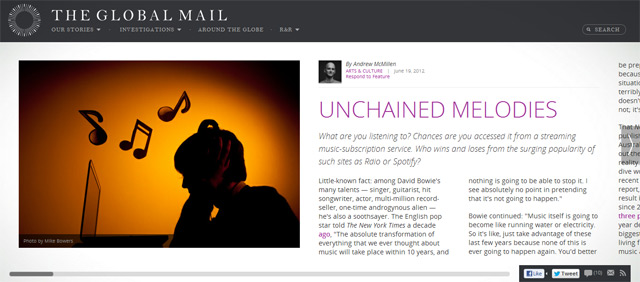The Global Mail story: ‘Unchained Melodies: streaming music in Australia’, June 2012
A story for The Global Mail, published in June 2012.
Excerpt below; click the image to read the full story on The Global Mail website.
Unchained Melodies
by Andrew McMillenWhat are you listening to? Chances are you accessed it from a streaming music-subscription service. Who wins and loses from the surging popularity of such sites as Rdio or Spotify?
Little-known fact: among David Bowie’s many talents — singer, guitarist, hit songwriter, actor, multi-million record-seller, one-time androgynous alien — he’s also a soothsayer. The English pop star told The New York Times a decade ago, “The absolute transformation of everything that we ever thought about music will take place within 10 years, and nothing is going to be able to stop it. I see absolutely no point in pretending that it’s not going to happen.”
Bowie continued: ”Music itself is going to become like running water or electricity. So it’s like, just take advantage of these last few years because none of this is ever going to happen again. You’d better be prepared for doing a lot of touring because that’s really the only unique situation that’s going to be left. It’s terribly exciting. But on the other hand it doesn’t matter if you think it’s exciting or not; it’s what’s going to happen.”
That New York Times article was published in June 2002. Ten years later, Australian music consumers find Bowie’s out-there predictions have become reality. Music sales have taken a severe dive worldwide; according to the most recent Recording Industry in Numbers report, 2011 delivered the “least negative result in global recorded music sales since 2004”; overall revenue fell by just three per cent, continuing the year-on-year decline.Today only a handful of the biggest artists can successfully earn a living from recording and releasing music alone; the vast majority of singers and players must tour regularly to top up their bank accounts, while simultaneously promoting their latest release.
And, perhaps most significantly, technological innovation and begrudging record-label cooperation have combined to offer music fans the chance to shun the concept of traditional ownership entirely, in favour of streaming millions of songs wherever they want, as often as they want, in exchange for a regular fee. It’s Mr Bowie’s music-as-utility forecast come true. Streaming music is here, and likely here to stay. For music fans, the benefits are clear. Subscribe to an online service like Rdio or Spotify — the two most popular players in an increasingly-crowded Australian market — for $12.90 or $12.99 per month, respectively, and you’ll have access to almost any song you’ve ever loved, plus a whole galaxy of tunes you don’t yet know. You’ll also be able to hear new music on the day it’s released at the record store and on Apple’s iTunes Store. (Since April 2003 the iTunes Store has sold more than 16 billion songs.)
Streaming offers an all-you-can-eat buffet of music, on your computer and your smartphone, and no matter how much you ‘eat’, the monthly fee remains the same. (Spotify also offers a free subscription, which automatically inserts audio advertisements into your playlist every 10 minutes or so.) Streaming is the most cost-effective and convenient means to music discovery ever mass-marketed; indeed, the initial enormity of the music library on offer — both Rdio and Spotify host 15 million-odd songs each — will overwhelm even the biggest fan.
That record labels succumbed to streaming service providers by licencing their artists’ music was no doubt driven by a desperate need to regain some control over their ailing profit margins. Peer-to-peer file-sharing technology like Napster, Kazaa and — more recently — BitTorrent are widely acknowledged to have decimated overall music sales from 1999 onwards. The record industry learned a hard lesson: if the option is available, the tech-savvy will choose not to pay for music.
Exactly how much this lesson cost the industry in lost sales revenue is impossible to measure, but it’s safe to say that the number in question is a whole number containing many, many zeroes. The labels’ great big hope is that the sheer convenience and relatively low cost of streaming will function as a finger in the proverbial dyke. A month’s unlimited subscription to Rdio or Spotify costs less than the average album does in-store, or on iTunes. Better that people pay a little money to hear their artists’ music, the labels figure, than nothing at all. The recording artists generally can’t choose whether or not their music is streamed, as their record labels usually hold the rights over how and where their music can be sold. Only the biggest fish can swim against the tide: bands such as The Beatles, Coldplay, Metallica and AC/DC all have opted out of including their respective catalogues on streaming services. Spotify won’t be drawn on the amount of revenue that gradually filters down to individual artists; spokespeople have only ever stated publicly that 70 per cent of the company’s revenue from subscriptions and ad sales goes to record labels, which then pass on a small percentage of the per-stream revenue to the artists.
Perhaps it’s always been true that only the foolhardy would pursue a career in music with the primary goal of wealth in mind. But now it seems that the money-laden scales are tipping further away from the songwriters and performers in favour of those who build and maintain the tech services which enable the sale, distribution and consumption of music.(Just ask Apple’s shareholders.) So, is streaming going to kill the rock star?
To read the full story, visit The Global Mail.
Elsewhere: a conversation with Scott Bagby and Carter Adamson of streaming music service Rdio, February 2012.
